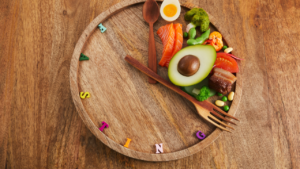What to Avoid During Intermittent Fasting for Better Results
Learn what to avoid during intermittent fasting to maximize results. Discover which foods disrupt your fast and which support your fasting goals. Start today!
What to Avoid During Intermittent Fasting for Better Results
Intermittent fasting can be an effective weight loss strategy, but to maximize its benefits, you must also pay attention to what to avoid during intermittent fasting. The foods and drinks you choose to consume during both your fasting and eating windows play a significant role in your fasting success. From sugary beverages to refined carbs, some common foods can disrupt your fast and hinder your results. This guide will help you understand what to avoid during intermittent fasting to achieve better outcomes and maintain your energy levels.
Why Eating the Right Foods and Avoiding Certain Foods Matters During Intermittent Fasting
Intermittent fasting isn’t just about when you eat; it’s also about what you eat. The foods you select during your eating windows can either enhance or undermine the benefits of fasting. Consuming nutrient-dense foods ensures that you stay energized, while avoiding certain foods ensures that you maintain metabolic stability and achieve the goals you’ve set for yourself.
When fasting, you aim to give your digestive system a break, and you need to choose foods that support your body during this rest period. Avoiding processed foods, refined sugars, and unhealthy fats can help you get the best possible results. But don’t worry, intermittent fasting doesn’t mean you have to deprive yourself of all delicious foods—it’s just about making better choices.
In this article, we will explore what to avoid during intermittent fasting and why making the right dietary decisions is crucial for success. You’ll also discover nutrient-dense foods to focus on that will keep your body fueled without hindering your fasting efforts.
Nutrient-Dense Foods to Include During Your Eating Window for Optimal Fasting Results
During your eating window, you’ll want to fill your plate with foods that provide long-lasting energy, promote fat-burning, and support muscle preservation. These nutrient-dense foods are vital to achieving the best results from your fasting routine.
1. High-Quality Protein Sources
Protein plays a crucial role in maintaining muscle mass while promoting fat loss. When you fast, your body is in a catabolic state, meaning it can start breaking down muscle tissue for fuel. To prevent this, you need adequate protein intake during your eating window.
Best Protein Sources:
- Chicken and Turkey Breast: Lean and packed with protein.
- Fish and Seafood: Salmon, tuna, and sardines are excellent sources of protein and omega-3 fatty acids.
- Eggs: A versatile source of high-quality protein and essential vitamins.
- Legumes and Beans: For plant-based protein, consider chickpeas, lentils, and black beans.
These protein sources not only help prevent muscle loss, but they also keep you feeling full longer, making it easier to stick to your intermittent fasting routine.
2. Healthy Fats
Fat is an essential macronutrient for energy, brain function, and hormone regulation. Healthy fats also help you feel satisfied, making it easier to avoid snacking and overeating.
Best Healthy Fats to Include:
- Avocados: Packed with heart-healthy monounsaturated fats and fiber.
- Nuts and Seeds: Almonds, walnuts, chia seeds, and flaxseeds are rich in omega-3 fatty acids and fiber.
- Olive Oil: Use olive oil for cooking or as a dressing to add healthy fat to your meals.
Healthy fats not only provide lasting energy, but they also help reduce inflammation and support overall health, especially when you’re fasting.
3. Vegetables and Leafy Greens
Vegetables are low in calories but high in fiber and essential nutrients like vitamins, minerals, and antioxidants. These foods will keep you full without compromising your caloric intake, helping you stay on track with your fasting goals.
Top Vegetables to Include:
- Spinach and Kale: High in fiber and packed with vitamins A, C, and K.
- Broccoli and Cauliflower: Rich in antioxidants and anti-inflammatory properties.
- Bell Peppers and Carrots: Full of vitamin C and beta-carotene, which support immune health.
Eating a variety of vegetables will also provide your body with important micronutrients to keep you healthy while fasting.
4. Whole Grains and Fiber-Rich Foods
Whole grains and fiber-rich foods are excellent for stabilizing blood sugar levels and providing steady energy. The fiber in whole grains helps promote healthy digestion, which is especially important during fasting.
Best Whole Grains:
- Quinoa: A complete protein and high in fiber.
- Brown Rice and Oats: Provide complex carbs and long-lasting energy.
- Sweet Potatoes: High in fiber and vitamins, they help stabilize blood sugar.
Incorporating these whole grains into your meals will keep you satisfied during your eating window and help prevent blood sugar spikes, which can be detrimental when fasting.
5. Hydrating Foods and Drinks
Since hydration is crucial for maintaining energy levels, be sure to include water-rich foods and beverages during your eating window. Proper hydration helps prevent fatigue and supports cellular functions, which is particularly important when you’re fasting.
Top Hydrating Foods:
- Cucumbers: High in water content and help keep you hydrated.
- Watermelon and Berries: Low-calorie, hydrating fruits that are also rich in antioxidants.
- Coconut Water: A natural source of electrolytes to rehydrate your body.
Hydrating Beverages:
- Water: Always your best option for staying hydrated.
- Herbal Teas: Peppermint, chamomile, and ginger are excellent for digestion and hydration.
6. Fermented Foods for Gut Health
Fermented foods are a great addition to your intermittent fasting diet because they promote gut health and help improve digestion. Probiotics found in fermented foods support a balanced microbiome and can alleviate digestive issues.
Best Fermented Foods:
- Greek Yogurt: Full of probiotics and protein.
- Kimchi and Sauerkraut: Fermented vegetables that boost gut health.
- Kefir: A fermented milk drink that is high in probiotics and easy to digest.
Incorporating fermented foods into your meals can help with nutrient absorption and digestion during your eating window.
Foods to Avoid During Intermittent Fasting: What to Skip for Maximum Fasting Benefits
While intermittent fasting is all about when you eat, it’s just as important to pay attention to what to avoid during intermittent fasting. Some foods can hinder your results, disrupt your fast, or spike your insulin levels. Here’s what to avoid:
Sugary Beverages: The Hidden Saboteurs of Your Fast
Sugary drinks like sodas, sweetened teas, and energy drinks may seem harmless but can break your fast and make it harder to maintain your fasting state. These drinks lead to insulin spikes and blood sugar fluctuations, both of which are detrimental to fasting results.
Why They’re Problematic:
- Insulin Spikes: Sugary beverages cause rapid increases in insulin, which triggers fat storage.
- Increased Hunger: The quick sugar crash following a sweet drink leaves you feeling hungrier.
- Empty Calories: Sugary drinks provide no nutritional value.
Examples to Avoid:
- Soda (regular and diet)
- Sweetened coffee drinks
- Energy drinks
- Sweetened iced teas
Stick to water, herbal teas, or black coffee without sugar to avoid these issues.
Processed Meats: High in Unhealthy Fats and Sodium
Processed meats like bacon, sausages, and deli meats are high in unhealthy fats and sodium, which can lead to bloating, water retention, and increased inflammation. These foods are also often packed with preservatives, making them less healthy overall.
Why They’re Problematic:
- Unhealthy Fats: Processed meats are often loaded with trans fats, which are linked to heart disease and obesity.
- Excess Sodium: High sodium content can lead to water retention and bloating.
- Preservatives: Nitrates and nitrites in processed meats can cause long-term health issues.
Examples to Avoid:
- Bacon
- Hot dogs
- Sausages
- Deli meats
Opt for leaner protein sources like grilled chicken, turkey, fish, or plant-based options such as beans and lentils.
Refined Carbohydrates: Spikes in Blood Sugar and Energy Crashes
Refined carbs, such as white bread, pastries, and sugary snacks, are quickly digested, causing blood sugar spikes and crashes. These fluctuations can interfere with your body’s ability to burn fat and make you feel hungrier.
Why They’re Problematic:
- Blood Sugar Spikes: These carbs break down quickly into sugar, causing rapid increases in blood sugar.
- Energy Crashes: The rapid rise and fall of blood sugar levels can make you feel fatigued and irritable.
- Low Nutrient Value: Refined carbs offer few nutrients and little fiber, which are essential during fasting.
Examples to Avoid:
- White bread and rolls
- Pastries, doughnuts, and cakes
- Chips and crackers
Instead, focus on whole grains, sweet potatoes, and other fiber-rich foods that support your energy levels and help maintain blood sugar stability.
Packaged Snacks and Junk Foods: High in Additives and Sugar
Packaged snacks and junk foods are full of artificial flavors, preservatives, and unhealthy fats, all of which can disrupt your fasting efforts. These foods often lead to overeating and provide no nutritional benefits.
Why They’re Problematic:
- Empty Calories: These snacks provide little to no nutritional value while contributing to weight gain.
- Chemical Additives: Many packaged foods contain preservatives and artificial ingredients that can negatively impact your health.
- Blood Sugar Imbalances: The sugar and refined carbs in these snacks cause blood sugar fluctuations.
Examples to Avoid:
- Packaged cookies, chips, and candy
- Pre-packaged baked goods
- Microwaveable meals
Instead, opt for whole foods like fresh fruits, vegetables, and nuts as healthier alternatives.
Artificial Sweeteners: A Deceptive Alternative
Artificial sweeteners may seem like a good option to avoid sugar, but they can still interfere with your fasting process and lead to increased cravings for sweet foods.
Why They’re Problematic:
- Insulin Response: Some artificial sweeteners can trigger an insulin response, even though they contain no calories.
- Increased Cravings: Artificial sweeteners can make you crave more sugary foods.
- Gut Health Issues: Some sweeteners disrupt the gut microbiome, which may affect your overall health.
Examples to Avoid:
- Aspartame
- Sucralose (Splenda)
- Saccharin
- Acesulfame potassium
Use natural sweeteners like stevia or monk fruit in moderation if needed.
External References for Further Reading
For additional information on intermittent fasting and its health benefits, consider the following trusted resources:
- National Institutes of Health (NIH): The NIH offers valuable insights into the physiological effects of fasting, metabolic health, and nutrition. Learn more about intermittent fasting and its impact on weight loss and health.
- Centers for Disease Control and Prevention (CDC): The CDC provides resources on maintaining a healthy diet while managing weight. Visit the CDC’s guide to healthy eating for more tips on what to eat during intermittent fasting.
- World Health Organization (WHO): WHO’s guidelines on healthy eating can help you make the right dietary choices. Explore their recommendations for nutrient-dense foods that align with fasting principles.
These references provide scientifically-backed information on fasting, nutrition, and maintaining a balanced diet during your fasting regimen
Maximize Your Intermittent Fasting Results by Avoiding These Foods
Intermittent fasting can provide powerful health benefits, but to see the best results, it’s essential to avoid certain foods that can hinder your progress. By staying clear of sugary beverages, processed meats, refined carbs, and artificial sweeteners, you can help your body stay in a fasting-friendly state and achieve your health and weight loss goals.
Focus on nutrient-dense foods like lean proteins, healthy fats, vegetables, and whole grains to support your body during your eating window. And remember, hydration is key—water and herbal teas are your best friends while fasting.
With the right foods and drinks, intermittent fasting can be a transformative health strategy. Stick to this guide on what to avoid during intermittent fasting, and you’ll be well on your way to success.
Ready to boost your fasting results? Share your thoughts and experiences in the comments below!
Latest Updated on February 14, 2025 by admin
Published on February 4, 2025 by admin


